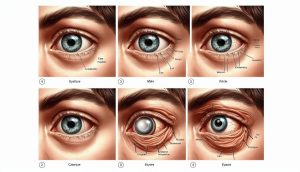What is Eye Surgery Consultation: Overview, Benefits, and Expected Results
Definition and Overview
An eye or ocular surgery consultation is a meeting between a patient and the surgeon who specializes in conditions affecting the eyes and its surrounding parts before a surgical procedure is planned.
Surgical procedures aren’t always the first choice when treating eye conditions. This is because the eye is a volatile organ that is highly susceptible to injury and although technologies today have never been better, surgery doesn’t always assure that all eye conditions can be corrected. However, it promises much better outcomes when compared to other options such as prescription glasses. Also, just like in other types of surgeries, there are risks involved, which can range from minor to major problems that may be irreversible or irreparable.
In cases when surgery is a viable or the primary option, a patient sees an ophthalmologist with a fellowship or additional years of training in surgery and who specializes in the patient’s specific eye problems. Ophthalmologists can focus on retina, cornea or age-related conditions like macular degeneration or glaucoma.
Surgery is one of the major differences between optometrists and ophthalmologists. While the former can also treat and manage different eye conditions, more complex ones that require surgery are handled by ophthalmologists who have adequate training, education and expertise in surgery. Nevertheless, both of them can work together to promote better eye health for the patient.
Who Should Undergo and Expected Results
Eye surgery consultation is performed upon the recommendation of a general ophthalmologist. It could be for the following reasons:
- The initial treatments, which may include wearing prescription glasses or contact lenses, are no longer working.
- The eye condition has already progressed, rendering eye devices less effective.
- The eye problem can only be corrected through surgery
- The patient prefers to undergo surgery over non-surgical options to get better results
The consultation can also be carried out to correct an error that resulted from previous surgery. This can be performed by either the same or another surgeon. The consultation can also take place in cases where a second opinion is desired, which happens when the patient wants to confirm if surgery is the best treatment available for his condition or when he’s unhappy or dissatisfied with his relationship with his current ophthalmologic or ocular surgeon.
A surgeon takes his time during the consultation to make sure that all details about the procedure, such as recovery time, techniques to be used, risks and complications as well as costs, are covered.
How Does the Procedure Work?
Unless it is an emergency case, a patient schedules an appointment with a clinic or a hospital that has a dedicated ocular department. In certain instances, however, the surgeon works in a community setting.
Before the consultation, the patient or the office of the general ophthalmologist who made the referral is instructed to forward all pertinent medical records to the surgeon. The patient will also have to bring all medications he is currently taking for his eye condition as well as a family member or a friend just in case certain exams may make driving dangerous or impossible for the time being.
On the scheduled date, a staff member helps the patient fill out the needed questionnaires and forms. The records will be checked thoroughly to ensure that the most important pieces of information are provided.
During the consultation, the surgeon:
- Reviews the medical information forwarded to him by the general ophthalmologist or the patient
- Asks the patient about his overall health condition, especially the status of the eyes and his reason for wanting to undergo surgery
- Inquires about the patient’s family and personal medical history, lifestyle, habits and medications being taken
Assesses whether the patient needs or is eligible for surgery
If the patient is a candidate for surgery, the surgeon proceeds to talk about surgical details including:Preparation, which may require additional tests
- Surgical technique to be utilized
- Specific steps the surgeon will take during surgery
- Risks and complications
- Cost and financing options
- Possible outcome of the procedure
- Post follow-up care
- Recovery steps
- Management of the eyes post-surgery
A consultation may take at least 30 minutes to an hour to complete. In most cases, one consultation is enough, and the surgeon can proceed with the surgery.
Possible Risks and Complications
A child who is undergoing eye surgery consultation may be less cooperative as he may not appreciate going through more exams or sitting in a health care setting for a long time. He may also find the doctor intimidating, increasing his anxiety. Some adults too may delay surgery, which means the details discussed during consultation may no longer apply once the patient decides to proceed with the treatment.
Reference:
- American Academy of Ophthalmology Retina Panel. Preferred Practice Pattern Guidelines. Diabetic retinopathy. 2012. Available at: www.aao.org/ppp.
/trp_language]
**What is Eye Surgery Consultation: Overview, Benefits, and Expected Results**
**Overview**
An eye surgery consultation is a visit to an ophthalmologist where patients can discuss potential surgical procedures for their eye conditions. The consultation typically involves an eye exam, discussion of treatment options, and formulation of a surgical plan.
**Benefits**
* **Personalized treatment:** The consultation allows the ophthalmologist to assess the patient’s specific condition and determine the best surgical approach.
* **Informed decision-making:** Patients can ask questions, discuss potential risks and benefits, and make informed decisions about their eye health.
* **Early intervention:** Identifying and addressing eye conditions early on can improve surgical outcomes and prevent further vision loss.
**Expected Results**
The expected results of an eye surgery consultation depend on the underlying condition and the specific procedure recommended. However, most patients can expect:
* **Vision improvement:** Surgeries for conditions such as cataracts and macular degeneration can significantly improve vision.
* **Reduced pain and discomfort:** Procedures like glaucoma surgery can alleviate pain and discomfort caused by elevated eye pressure.
* **Corrected eye misalignment:** Surgeries such as strabismus surgery can correct misaligned eyes, enhancing cosmetic appearance and binocular vision.
**Typical Eye Conditions Requiring Surgery**
* Cataracts
* Glaucoma
* Macular degeneration
* Retinal detachment
* Corneal disorders
**Steps in an Eye Surgery Consultation**
1. **Comprehensive eye exam:** Dilation of pupils, visual acuity testing, and examination of eye structures.
2. **Medical history and lifestyle review:** Discussion of past and current health conditions, medications, and visual symptoms.
3. **Surgical options presented:** The ophthalmologist explains the possible surgical procedures, their potential outcomes, and any associated risks.
4. **Decision-making:** Patients consider the information provided and make an informed decision about whether or not to proceed with surgery.
5. **Surgical plan development:** If surgery is chosen, the ophthalmologist outlines the procedure details, including anesthesia type, preoperative preparation, and postoperative care.
**Importance of an Eye Surgery Consultation**
Seeking an eye surgery consultation is crucial for the following reasons:
* Ensuring accurate diagnosis and appropriate treatment
* Optimizing surgical outcomes
* Managing expectations and minimizing risks
* Providing emotional support and guidance
**Conclusion**
An eye surgery consultation is an essential step in managing and treating eye conditions. By providing personalized assessments, empowering patients with information, and setting realistic expectations, consultations help individuals make informed decisions about their eye health and achieve optimal surgical outcomes.








**Title: Eye Surgery Consultation: Overview, Benefits, and Potential Outcomes**
**Title: Eye Surgery Consultation: An Overview of Benefits and Potential Results**